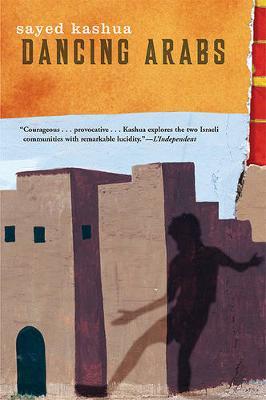Dancing Arabs

Dancing Arabs
A bildüngsroman suffused with humor and irony, Dancing Arabs centers on a young boy from a poor Arab village, his haphazard receipt of a scholarship to a Jewish boarding school, and the dislocation and alienation that ensues when he finds himself faced with the impossible: the imperative to straddle two famously incompatible worlds. As a child, our nameless narrator/antihero lives with his family in his grandmother's house. His grandmother and father constantly impress upon him the significance of their land: when so many people fled or sold theirs away, they held strong. Better to die fighting for your land than to give it away.
Every night after his brothers fall asleep, he climbs into bed with his grandmother, his main source of comfort and protection. One night she tells him where the key to her secret cupboard are, and if she should die, he must find all the death equipment in the blue bag. Paranoid from then on, he races home every day at recess to see if she's died. One day he gets there and she is not there, so he unlocks the cupboard and pulls out the box. All he finds are towels and some soaps from Mecca, but then he notices his father's photo in the old newspaper lining the suitcase, and some postcards in his father's handwriting. At his urging, his grandmother tells him about the newspaper clippings: his father was always the handsomest and the smartest in Tira, until he was thrown in jail for his political activity (eg: bombing a school cafeteria). The grandmother visited her son every week, wrote letters to the mayor, anyone who might be able to help her son. When he was released years later, he remained politically active, revering the Egyptian president Nasser, and for a time, joined the communist party. The young narrator is nothing like his father, who doesn't understand how my brothers and I came out the way we did. We can't even draw a flag. He says kids smaller than us walk through the streets singing 'P-L-O----Israel NO!' and he shouts at us for not even knowing what PLO stands for. Not at all politically motivated, the boy knows nothing of national identity; he simply wants to get through the school day without getting smacked by his teacher. He excels at school and his family dreams that by the time he gr
PRP: 117.80 Lei
Acesta este Prețul Recomandat de Producător. Prețul de vânzare al produsului este afișat mai jos.
106.02Lei
106.02Lei
117.80 LeiLivrare in 2-4 saptamani
Descrierea produsului
A bildüngsroman suffused with humor and irony, Dancing Arabs centers on a young boy from a poor Arab village, his haphazard receipt of a scholarship to a Jewish boarding school, and the dislocation and alienation that ensues when he finds himself faced with the impossible: the imperative to straddle two famously incompatible worlds. As a child, our nameless narrator/antihero lives with his family in his grandmother's house. His grandmother and father constantly impress upon him the significance of their land: when so many people fled or sold theirs away, they held strong. Better to die fighting for your land than to give it away.
Every night after his brothers fall asleep, he climbs into bed with his grandmother, his main source of comfort and protection. One night she tells him where the key to her secret cupboard are, and if she should die, he must find all the death equipment in the blue bag. Paranoid from then on, he races home every day at recess to see if she's died. One day he gets there and she is not there, so he unlocks the cupboard and pulls out the box. All he finds are towels and some soaps from Mecca, but then he notices his father's photo in the old newspaper lining the suitcase, and some postcards in his father's handwriting. At his urging, his grandmother tells him about the newspaper clippings: his father was always the handsomest and the smartest in Tira, until he was thrown in jail for his political activity (eg: bombing a school cafeteria). The grandmother visited her son every week, wrote letters to the mayor, anyone who might be able to help her son. When he was released years later, he remained politically active, revering the Egyptian president Nasser, and for a time, joined the communist party. The young narrator is nothing like his father, who doesn't understand how my brothers and I came out the way we did. We can't even draw a flag. He says kids smaller than us walk through the streets singing 'P-L-O----Israel NO!' and he shouts at us for not even knowing what PLO stands for. Not at all politically motivated, the boy knows nothing of national identity; he simply wants to get through the school day without getting smacked by his teacher. He excels at school and his family dreams that by the time he gr
Detaliile produsului










